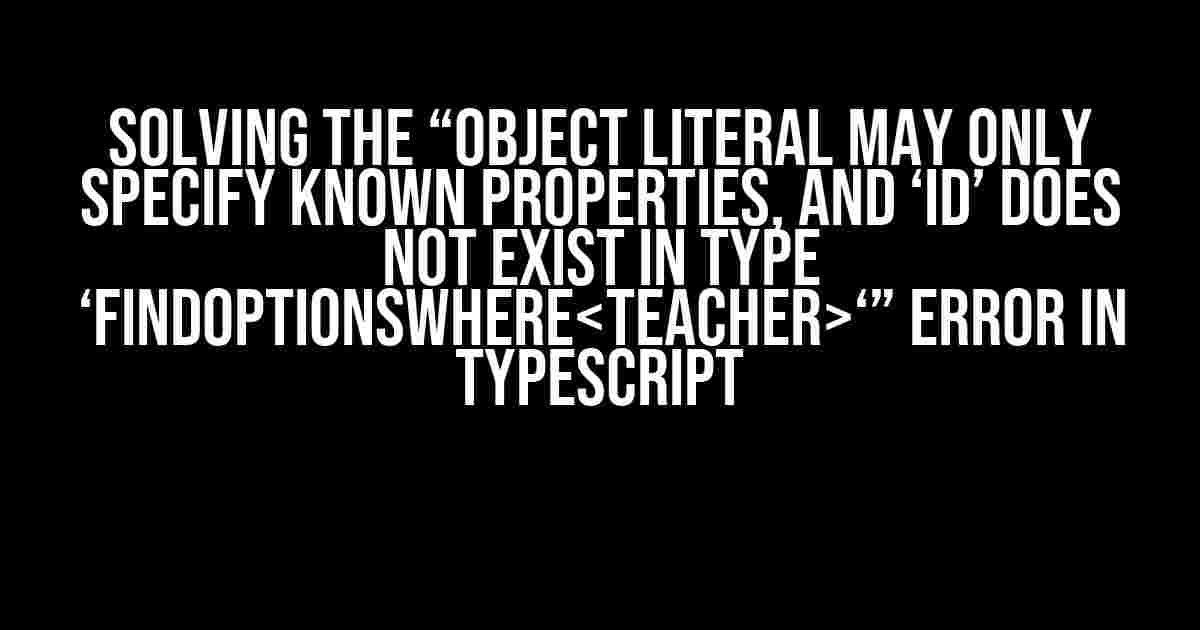Are you stuck with the frustrating “Object literal may only specify known properties, and ‘id’ does not exist in type ‘FindOptionsWhere‘” error in TypeScript? Don’t worry, you’re not alone! This error can be perplexing, but fear not, dear developer, for we’re about to embark on a journey to conquer this obstacle together.
Understanding the Error
The error message “Object literal may only specify known properties, and ‘id’ does not exist in type ‘FindOptionsWhere‘” is thrown by TypeScript when it encounters an object literal that attempts to define a property that is not part of the type definition. In this case, the type is `FindOptionsWhere`, and the property is `id`.
To grasp the root of the issue, let’s break down the components involved:
Object literal: An object created using the literal syntax, e.g.,{ id: 1, name: 'John' }.FindOptionsWhere: A type that represents the options for finding a specific `Teacher` entity.id: A property that is not part of the `FindOptionsWhere` type definition.
Cause of the Error
The error occurs when you try to create an object literal that includes a property not defined in the `FindOptionsWhere` type. This can happen when:
- You’re working with a library or framework that uses TypeScript, and you’re trying to create a custom `FindOptionsWhere` object.
- The `FindOptionsWhere` type doesn’t include the `id` property in its definition.
- You’re attempting to add the `id` property to the object literal, which TypeScript doesn’t recognize as a valid property for that type.
Solutions
Now that we understand the error, let’s explore the solutions to overcome this hurdle:
Solution 1: Check the Type Definition
First, verify that the `id` property is not part of the `FindOptionsWhere` type definition. If it’s not, you can:
- Create a custom interface that extends `FindOptionsWhere` and adds the `id` property.
- Use the custom interface instead of the original type.
interface CustomFindOptionsWhere extends FindOptionsWhere<Teacher> {
id: number;
}
const options: CustomFindOptionsWhere = {
id: 1,
// other properties...
};Solution 2: Use the `any` Type
If you’re certain that the `id` property is not part of the `FindOptionsWhere` type definition, but you still need to use it, you can:
- Cast the object literal to the `any` type using the `as` keyword.
- This will bypass TypeScript’s type checking for that specific object literal.
const options = {
id: 1,
// other properties...
} as any;Solution 3: Create a Separate Object
Alternatively, you can create a separate object that includes the `id` property and other required properties, and then:
- Assign the separate object to a variable of type `FindOptionsWhere`.
- Use the spread operator (`…`) to merge the two objects.
const idObject = { id: 1 };
const findOptions: FindOptionsWhere<Teacher> = { ...idObject, /* other properties */ };Best Practices
To avoid encountering this error in the future, follow these best practices:
| Best Practice | Description |
|---|---|
Verify type definitions |
Always check the type definition for the object literal you’re working with. |
Use interfaces and type aliases |
Create custom interfaces and type aliases to extend existing types and add required properties. |
Avoid using the |
Only use the any type as a last resort, as it bypasses TypeScript’s type checking. |
Keep type definitions up-to-date |
Regularly review and update your type definitions to ensure they align with your project’s requirements. |
Conclusion
With these solutions and best practices, you should be able to overcome the “Object literal may only specify known properties, and ‘id’ does not exist in type ‘FindOptionsWhere‘” error in TypeScript. Remember to always verify type definitions, use interfaces and type aliases, avoid using the `any` type, and keep your type definitions up-to-date.
By following these guidelines, you’ll be well-equipped to tackle this error and ensure your TypeScript code remains robust, maintainable, and error-free.
Frequently Asked Question
Got stuck with the pesky “Object literal may only specify known properties, and ‘id’ does not exist in type ‘FindOptionsWhere‘” error? Worry not, friend! We’ve got the answers to your burning questions.
What does this error even mean?
This error occurs when you’re trying to use a property that doesn’t exist in the type ‘FindOptionsWhere‘. It’s like trying to find a needle in a haystack, but the haystack doesn’t even have needles! In this case, the property ‘id’ is not recognized in the type ‘FindOptionsWhere‘.
Why is TypeScript being so picky?
TypeScript is just doing its job! It’s a statically-typed language, which means it checks for type errors at compile-time rather than runtime. This error is a safety net to prevent you from using properties that might not exist, which could lead to runtime errors. So, be grateful for TypeScript’s eagle eye!
How do I fix this error?
To fix this error, you need to ensure that the property ‘id’ exists in the type ‘FindOptionsWhere‘. Check your type definitions and make sure ‘id’ is included. If it’s not, you might need to update your type or interface to include the ‘id’ property. Alternatively, if you’re using a library or framework, check their documentation to see if they have any specific requirements for the ‘FindOptionsWhere’ type.
Can I just use the ‘any’ type to avoid this error?
While using the ‘any’ type might seem like an easy fix, it’s not recommended. The ‘any’ type disables type checking, which means you’ll lose the benefits of using TypeScript in the first place. Instead, take the time to fix the underlying issue and ensure your types are correct. Your code will be safer and more maintainable in the long run!
What if I’m still stuck?
Don’t worry, friend! If you’re still stuck, try checking the official TypeScript documentation, searching for answers on Stack Overflow, or reaching out to the TypeScript community for help. And if all else fails, take a deep breath, grab a cup of coffee, and debug your code step by step. You got this!
